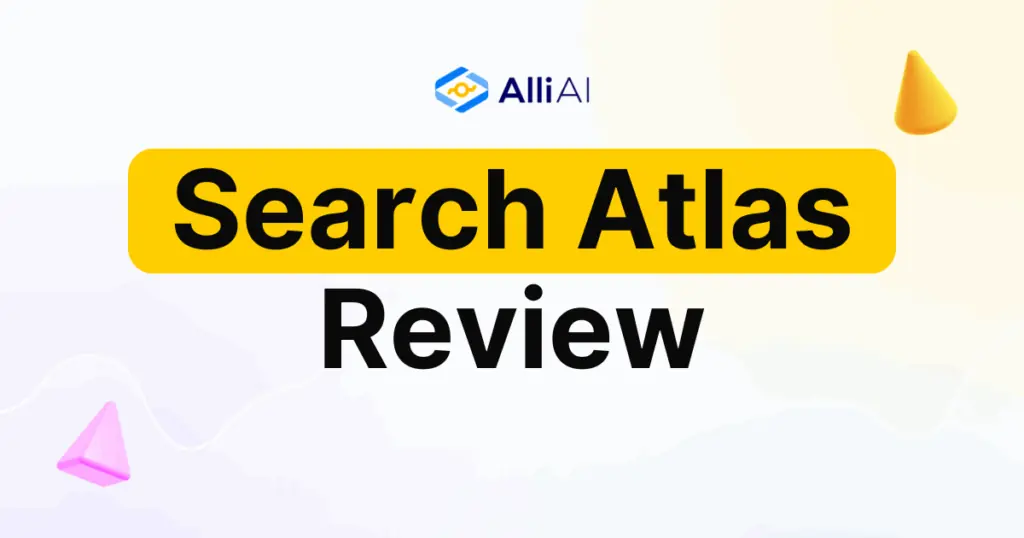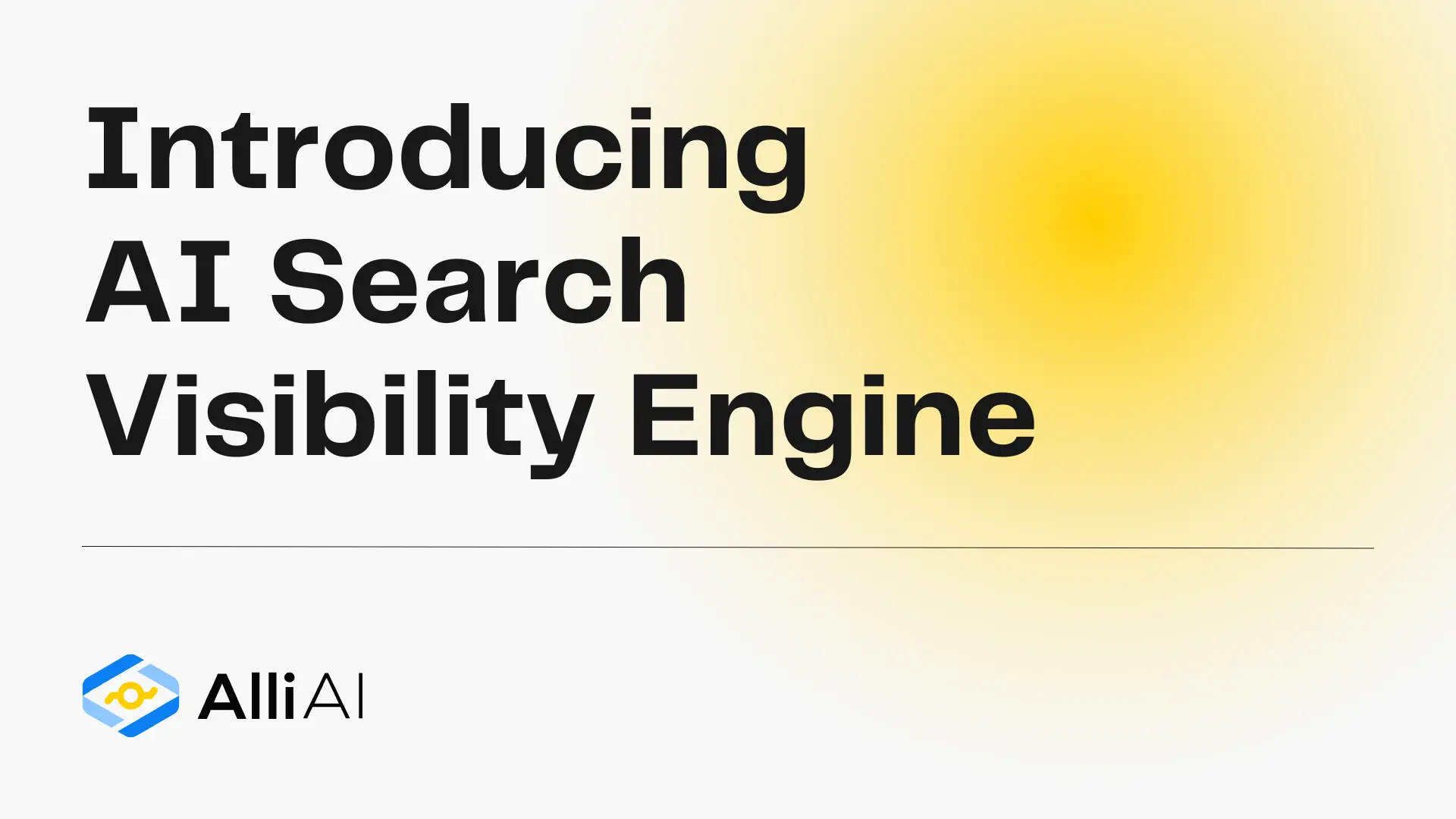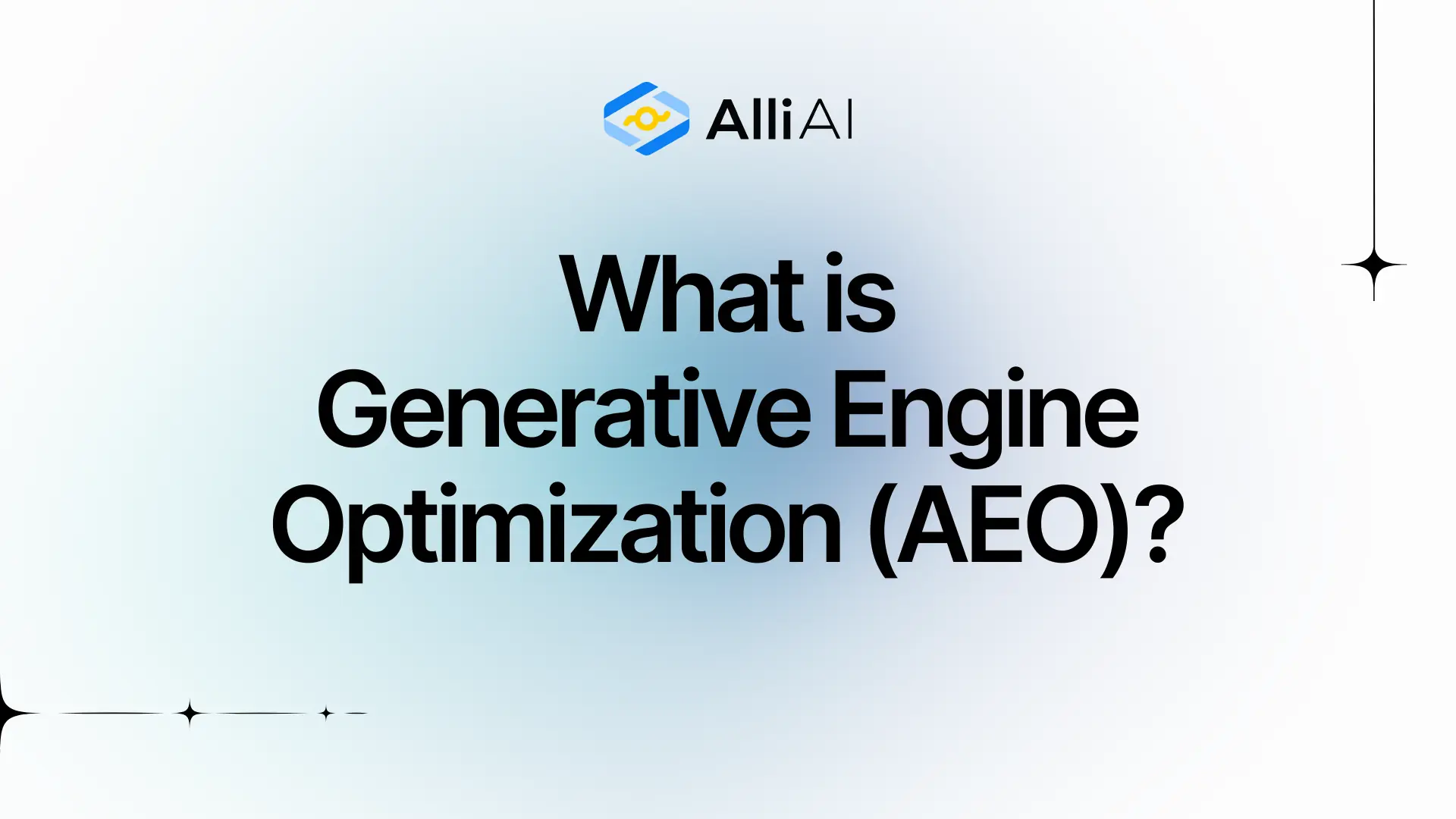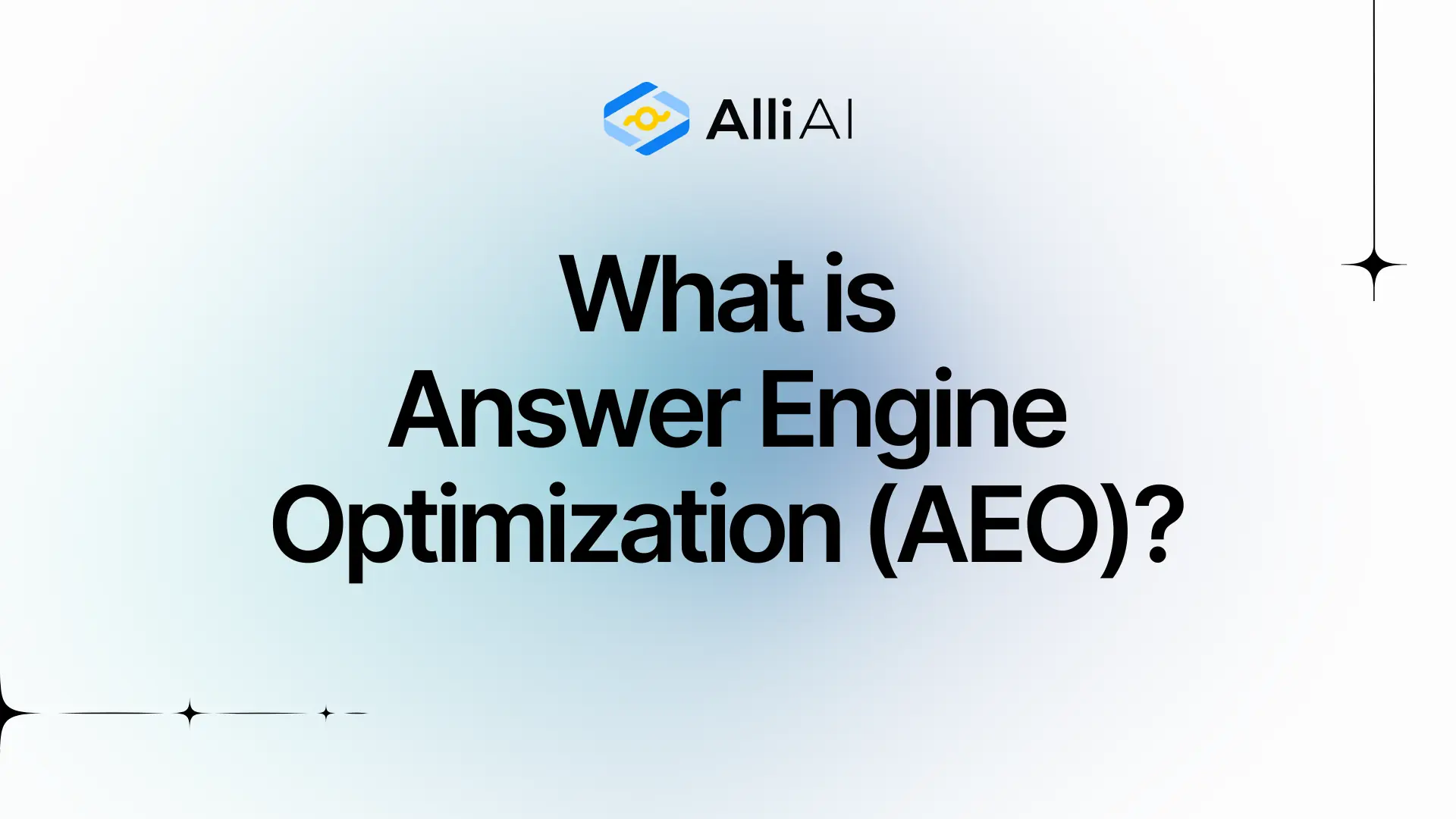Search Atlas has positioned itself as “a SEO Automation Platform” with an ambitious suite of over 40 SEO tools designed to consolidate the functionality of multiple platforms into one solution. After thorough analysis of the platform’s capabilities, user experiences, and market positioning, we’ve compiled this comprehensive review to help you understand what Search Atlas offers and whether it aligns with your SEO needs.
What is Search Atlas?
Search Atlas is an all-in-one SEO platform that combines traditional SEO tools with AI-powered automation features. The platform aims to replace multiple SEO subscriptions by offering keyword research, backlink analysis, content optimization, rank tracking, and their flagship OTTO AI automation system in a single dashboard.
Founded with the goal of simplifying SEO for agencies and businesses, Search Atlas claims to help users “cut 90% of the grunt work” through automation while providing access to what they describe as “100 trillion website links” for competitive analysis.
Company Background
Search Atlas operates as a comprehensive SEO software solution, though public information about the company’s founding team and funding is limited. The platform has gained traction particularly among small to mid-sized agencies looking for cost-effective alternatives to enterprise SEO tools.
Core Platform Features
1. OTTO AI Integration
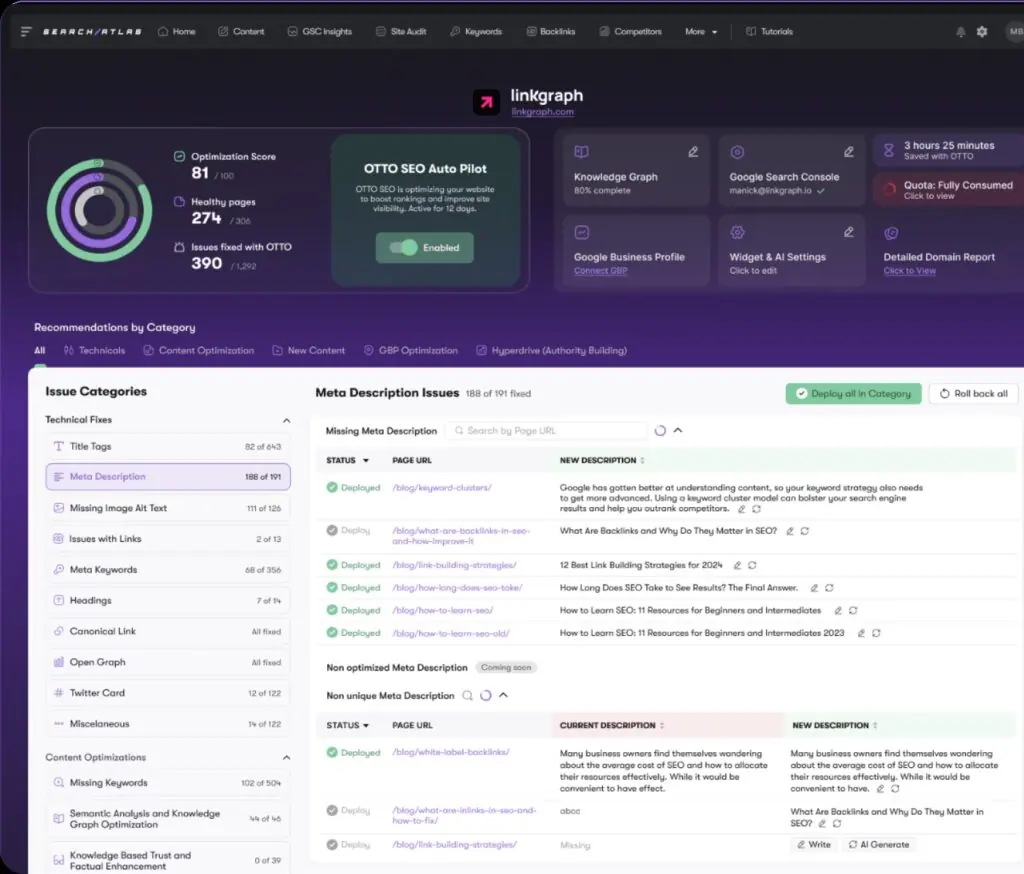
The platform’s most distinctive feature is OTTO, an AI-powered SEO automation system that operates through JavaScript implementation. OTTO promises to identify and deploy SEO improvements across websites automatically.
Capabilities: OTTO can identify technical issues, generate optimization recommendations, and implement approved changes through the Search Atlas pixel. The AI analyzes sites regularly and provides actionable recommendations.
User Experience: While innovative, users note that OTTO requires significant manual review of suggestions. The automation is perhaps better described as “AI-assisted” rather than fully autonomous, as most changes require human approval before deployment.
2. Keyword Research Suite
Search Atlas offers keyword research tools including a keyword magic tool, content planner, and keyword gap analysis.
Database Size: The platform advertises access to 5.2 billion keywords, which, while substantial, is smaller than established competitors like Ahrefs (22 billion) or SEMrush (25 billion).
Functionality: The keyword tools provide essential metrics like search volume, difficulty, and CPC. Users find the interface intuitive, though some note the data freshness can lag behind specialized keyword research tools.
3. Backlink Analysis Tools
The backlink suite includes link analysis, toxic backlink identification, and link gap analysis features.
Strengths: The visual representation of backlink profiles is well-designed and easy to interpret. The toxic backlink identifier can be helpful for link audit projects.
Limitations: Users report the backlink database isn’t as comprehensive as dedicated tools like Ahrefs or Majestic, which may impact competitive analysis accuracy.
4. Content Creation and Optimization
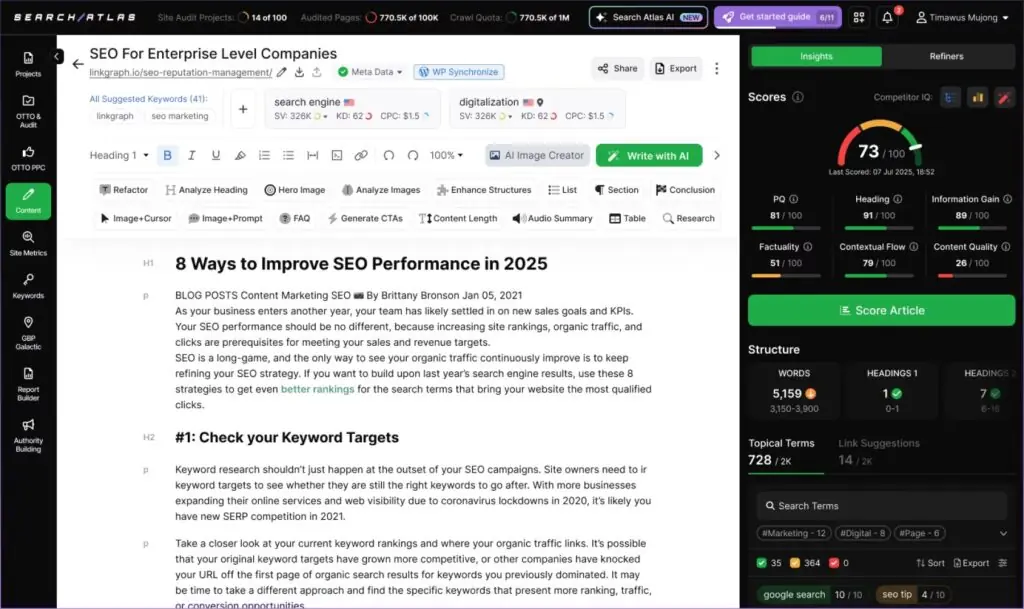
Search Atlas includes an AI content writer, bulk content generation, and a “Content Genius” editor with NLP optimization.
Performance: The AI writing capabilities are comparable to other GPT-based tools, producing serviceable first drafts that require editing. The topical map generator is particularly useful for content planning.
Considerations: Like most AI writing tools, the output tends toward generic without careful prompting. Users report needing significant editing for brand voice and accuracy.
5. Rank Tracking
The platform offers keyword rank tracking with local tracking capabilities and competitor monitoring.
Capacity: Plans range from 100 to 5,000 tracked keywords depending on subscription tier.
Accuracy: Rank tracking appears reliable for most users, though some report occasional discrepancies with Google Search Console data.
6. Technical SEO Tools
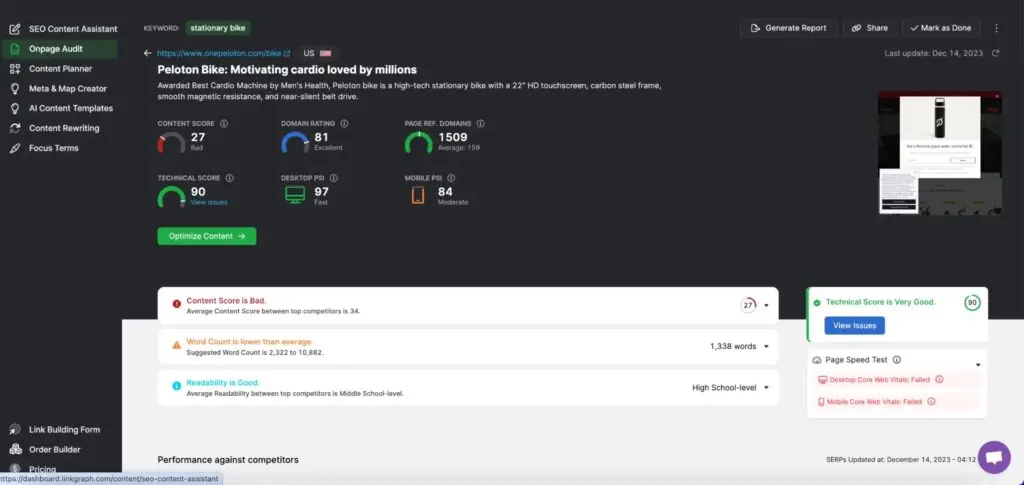
Search Atlas provides site auditing, crawling capabilities, and technical optimization features.
Audit Depth: The site auditor can crawl up to 1 million pages on enterprise plans, identifying common technical issues effectively.
Implementation Note: Technical fixes are primarily deployed through the JavaScript pixel rather than actual code changes, which has implications for permanence and performance.
Pricing Structure Analysis
Published Pricing Tiers
Starter Plan ($99/month):
- 1 OTTO project
- 500 AI points
- 100 credits
- Basic tool access
Professional Plan ($299/month):
- 3 OTTO projects
- 1,500 AI points
- 20 credits
- Extended features
Expert Plan ($649/month):
- 10 OTTO projects
- 5,000 AI points
- 100 credits
- Priority support
Agency Plan ($999/month):
- 25 OTTO projects
- 12,500 AI points
- 200 credits
- White label options
Understanding the Full Cost
The platform operates on multiple quota systems that merit careful consideration:
AI Points System: Used for content generation and AI-powered features. Users report that points can deplete quickly with regular use, particularly for content creation.
Credit System: Required for backlinks, citations, press releases, and other “premium” features. Additional credits cost $0.99 each, which can add substantially to monthly costs.
Per-Site Pricing: Each additional site beyond plan limits costs $69/month, making agency implementations potentially expensive.
Users frequently mention that actual monthly costs tend to exceed advertised prices once credit purchases and additional sites are factored in. One agency reported spending $300-400 monthly on what was initially a $99 plan.
User Experience and Platform Performance
Interface and Usability
The Search Atlas dashboard receives generally positive feedback for its visual design and navigation structure. Users appreciate the attempt to consolidate multiple tools, though some find the sheer number of features overwhelming initially.
Strengths:
- Clean, modern interface
- Logical tool organization
- Helpful onboarding wizards
Areas for Improvement:
- Some users report slow loading times
- Occasional timeout errors during large operations
- The “spinning circle of death” mentioned in multiple reviews
Platform Stability
User experiences with platform stability vary considerably. While some users report smooth operation, others have encountered technical challenges:
- Integration issues with certain CMS platforms
- Conflicts with caching plugins and CDN services
- Periodic disconnections requiring re-authentication
These issues appear more prevalent for users with complex technical stacks or enterprise-scale implementations.
Customer Support
Search Atlas provides customer support primarily through chat and email, with video calls available for higher-tier plans.
Response Times: Users report varying experiences, from quick resolutions to multi-day waits for complex issues. The absence of phone support is noted as a limitation by several enterprise users.
Support Quality: While many users praise individual support agents, others express frustration with the inability to escalate complex technical issues quickly.
Real-World Performance
SEO Results
User-reported outcomes vary significantly:
Positive Experiences: Some users report improvements in rankings and organic traffic, particularly those new to SEO who benefit from the guided recommendations.
Mixed Results: A notable number of users describe minimal impact despite implementing numerous recommendations, suggesting the quality of automated suggestions may vary.
Concerning Reports: Several users have documented ranking declines after implementing bulk recommendations, highlighting the importance of careful review before deploying changes.
Agency Use Cases
Agencies represent a key target market for Search Atlas, with mixed feedback:
Advantages:
- White label capabilities
- Multi-site management dashboard
- Comprehensive reporting features
Challenges:
- Per-client costs can escalate quickly
- Credit consumption unpredictability complicates client billing
- Some agencies report client satisfaction issues related to platform performance
One agency noted: “The platform has potential for managing multiple clients, but the economics become challenging when you factor in per-site costs and credit consumption.”
Technical Architecture Considerations
The JavaScript Implementation Model
Search Atlas’s reliance on JavaScript for deploying optimizations is a fundamental architectural decision with important implications:
How It Works: Changes are rendered client-side through the Search Atlas pixel, overlaying optimizations on existing page content rather than modifying source code.
Benefits:
- Platform-agnostic deployment
- No server access required
- Instant rollback capability
Trade-offs:
- Optimizations depend on JavaScript execution
- Potential performance impacts from additional processing
- Changes aren’t permanent without continued subscription
This approach differs from traditional implementations that modify actual website code, which has implications for long-term SEO strategy.
The Missing AI Search Component
While Search Atlas promotes itself as forward-thinking with AI features, there’s a notable blind spot in their architecture regarding AI search engines themselves. The platform’s JavaScript-based optimization model creates an unexpected vulnerability in the age of AI search.
The Oversight: Search Atlas’s OTTO pixel renders optimizations through JavaScript, which AI crawlers (GPTBot, ClaudeBot, PerplexityBot) cannot process. This means all the SEO improvements deployed through Search Atlas are invisible to ChatGPT, Claude, Perplexity, and other AI search platforms that increasingly drive discovery traffic.
Market Context: With billions of queries now happening through AI assistants, visibility in AI search results is becoming as important as traditional Google rankings. Sites optimized solely through JavaScript-based tools may find themselves excluded from AI-generated responses and citations.
The Technical Challenge: This isn’t a feature Search Atlas can easily add due to their architectural choices. AI crawlers need pre-rendered, static HTML—the opposite of JavaScript-rendered content. Some newer platforms have recognized this shift and built dedicated AI Search Visibility capabilities that serve optimized content specifically to AI crawlers while maintaining traditional SEO.
Users evaluating Search Atlas should consider whether focusing solely on traditional search optimization, while potentially sacrificing AI search visibility, aligns with their long-term digital strategy.
Comparison with Industry Standards
Versus Established Platforms
When compared to established tools like Ahrefs, SEMrush, or Moz:
Advantages:
- More affordable entry point
- Broader feature set in base plans
- AI automation attempts
Limitations:
- Smaller data sets
- Less frequent data updates
- Fewer third-party integrations
Versus Modern Implementation Tools
Compared to implementation-focused platforms like Alli AI:
Search Atlas Approach:
- JavaScript overlay system
- Credit-based feature access
- Emphasis on AI recommendations
Implementation-Focused Alternative:
- Direct code modifications
- One-time optimization deployment
- Focus on permanent changes
The choice between approaches depends on specific needs and technical preferences.
Who Should Consider Search Atlas?
Well-Suited For:
Small Businesses starting their SEO journey who benefit from guided recommendations and all-in-one functionality.
Solo SEO Consultants who need affordable access to multiple SEO tools without enterprise subscriptions.
Content Creators focusing on AI-assisted content generation and basic optimization.
May Not Be Ideal For:
Enterprise Organizations requiring proven stability, comprehensive support, and predictable costs.
Performance-Focused Websites where JavaScript overhead could impact user experience or Core Web Vitals.
Agencies at Scale where per-site pricing and credit systems may create challenging economics.
Advanced SEO Professionals who need deeper data and more sophisticated analysis capabilities.
Notable Considerations
1. Vendor Dependency
The JavaScript-based optimization model creates an ongoing dependency relationship. Optimizations require active subscription maintenance, which may not align with all business models.
2. Cost Predictability
The multi-tiered pricing structure (subscription + credits + AI points + per-site fees) can make budgeting complex, particularly for agencies with variable client needs.
3. Platform Maturity
As a relatively newer platform, Search Atlas is still evolving. While this brings innovation, it also means occasional stability issues and feature limitations compared to established tools.
4. Data Comprehensiveness
The platform’s databases, while substantial, are smaller than industry leaders. This may impact competitive analysis accuracy in highly competitive niches.
5. AI Search Readiness
The platform’s JavaScript-based approach may limit visibility to emerging AI search platforms. As ChatGPT, Claude, and Perplexity become primary discovery channels, the inability of AI crawlers to see JavaScript rendered optimizations could become a significant competitive disadvantage. Organizations should evaluate whether they need dedicated AI search optimization capabilities that work alongside traditional SEO.
Alternative Approaches to Consider
When evaluating Search Atlas, consider these alternative approaches:
Specialized Tool Combinations
Using best-in-class specialized tools (keyword research, backlink analysis, rank tracking) may provide deeper functionality, though at potentially higher combined cost.
Implementation-Focused Platforms
Tools that make permanent code changes rather than JavaScript overlays offer different value propositions for long-term optimization strategies.
Enterprise Solutions
Larger organizations may find enterprise platforms like BrightEdge or Conductor better suited to their scale and support requirements.
Final Assessment
Overall Rating: 3.5/5 Stars
Search Atlas represents an ambitious attempt to consolidate SEO tools while adding AI automation capabilities. The platform offers genuine value for specific use cases, particularly for users seeking an affordable entry into comprehensive SEO tooling.
The platform succeeds in providing broad functionality and innovative AI features at a competitive entry price. The interface is generally well-designed, and the attempt to simplify SEO through automation is commendable.
However, several factors warrant careful consideration. The JavaScript-based optimization approach, while innovative, introduces dependencies that may not suit all situations. The multi-layered pricing structure can lead to higher-than-expected costs. Platform stability and support responsiveness remain areas where user experiences vary significantly.
Recommendations
Consider Search Atlas if:
- You need affordable access to multiple SEO tools
- You’re comfortable with JavaScript-based implementations
- You value AI-assisted recommendations
- Your needs align with the platform’s current capabilities
Explore alternatives if:
- You require enterprise-grade stability and support
- Predictable, transparent pricing is essential
- You need permanent, code-level optimizations
- Your use case demands best-in-class data depth
The SEO tool landscape continues to evolve rapidly, with new approaches to automation and implementation emerging regularly. While Search Atlas offers interesting innovations, potential users should carefully evaluate whether its specific approach aligns with their technical requirements, budget constraints, and long-term SEO strategy.
Frequently Asked Questions
Q: Can I use Search Atlas without the OTTO pixel? A: Yes, many Search Atlas tools function independently of OTTO, though the automation features require pixel installation.
Q: How does Search Atlas compare to free tools? A: Search Atlas offers more comprehensive features than free tools, though whether the value justifies the cost depends on specific needs.
Q: Is the platform suitable for international SEO? A: Search Atlas supports multiple languages and regions, though data depth may vary by geography.
Q: Can I export data from Search Atlas? A: Yes, most tools offer CSV exports, though some users note limitations in export formats and data completeness.
Q: What happens to optimizations if I cancel? A: JavaScript-based optimizations cease to function without an active subscription. The platform offers a “Deep Freeze” option, though this involves additional considerations.
Q: Is there a money-back guarantee? A: Search Atlas offers a 48-hour refund window with specific usage limitations that users should review carefully.
This review is based on comprehensive analysis of user feedback, platform documentation, and industry comparisons as of September 2025. SEO tools evolve rapidly, and we recommend conducting your own evaluation based on current features and pricing before making a commitment.
